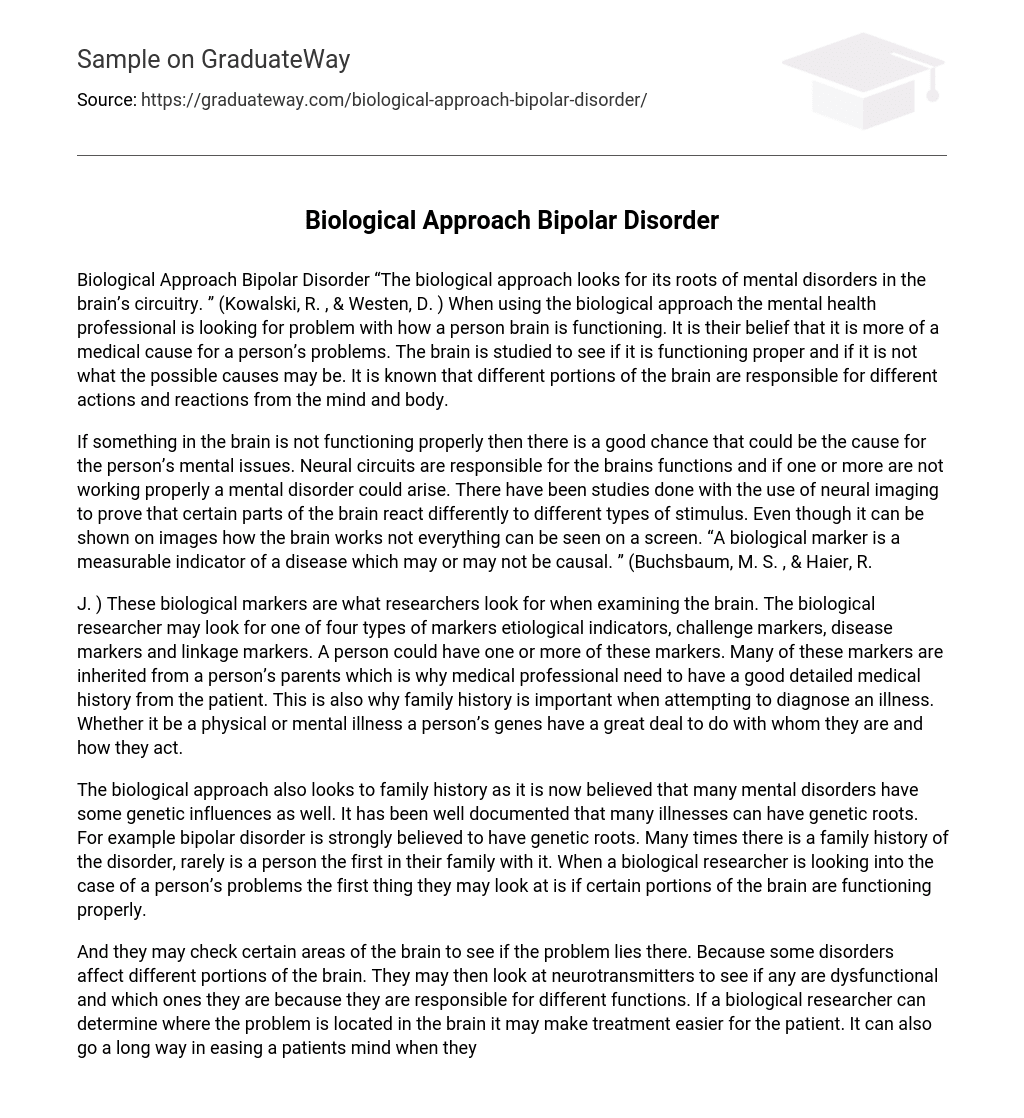According to Kowalski and Westen, the biological approach in mental health centers on the study of the brain’s circuitry as the basis for mental disorders. Practitioners who follow this approach explore issues related to brain functioning and believe that medical factors are influential in an individual’s challenges. They aim to evaluate proper brain functioning and determine potential causes of dysfunction through brain examination. It is acknowledged that specific brain regions are linked with distinct cognitive and physical responses.
When there is a malfunction in the brain, it can cause mental issues as the brain’s functions rely on neural circuits. If any of these circuits are not working correctly, it can lead to the emergence of a mental disorder. Research using neural imaging shows that various regions of the brain respond differently to various stimuli. However, imaging does not capture all aspects of brain function. Buchsbaum and Haier define a biological marker as an observable indication of a disease, regardless of whether it is the direct cause.
By analyzing markers in the brain, scientists can identify causes, difficulties, illnesses, or connections to conditions. These markers, which are mostly inherited from parents, may be present in an individual. Therefore, comprehensive medical and family records are necessary for medical professionals to diagnose these conditions. Genes play a significant role in determining an individual’s characteristics and behavior, impacting both physical and mental disorders.
The biological approach investigates the influence of genetics on mental disorders, recognizing that genes can contribute to certain conditions. Multiple studies have demonstrated the hereditary component of various illnesses. Bipolar disorder serves as a prime example, often presumed to have a genetic link. Frequently, there is a familial occurrence of this disorder, suggesting that individuals usually aren’t the first in their family to experience it. When examining an individual’s challenges from a biological standpoint, researchers commonly evaluate the adequate functioning of specific brain regions.
Scientists examine particular areas of the brain to detect potential problems and determine the cause of a disorder, which is crucial because different disorders can impact different regions of the brain. They also evaluate neurotransmitters to identify any abnormalities and establish their involvement, as these neurotransmitters have unique functions in various processes. By identifying the issue within the brain, it greatly aids in treatment and reassures patients that there is a logical explanation for their feelings and actions instead of simply labeling them as “crazy.”
The biological approach is commonly employed to diagnose different disorders, such as bipolar disorder. Biology plays a crucial role in the development of bipolar disorder, especially for individuals with a familial background of the disorder (Kowalski and Westen). Bipolar disorder is a psychological condition marked by extreme mood swings, also referred to as manic depression. Individuals with this disorder go through depressive episodes as well as manic episodes, which can be accompanied by intense feelings of euphoria.
People with bipolar disorder may have an exaggerated sense of invincibility and need less sleep during a manic phase, but they can also experience uncontrollable rambling thoughts. In contrast, depressive episodes in bipolar disorder can make it difficult for individuals to get out of bed even for basic needs like eating. They may also hear voices or have suicidal thoughts and auditory hallucinations. Feelings of helplessness or worthlessness are common in depression. Therefore, it is important to seek treatment to manage these symptoms. Prescription medications are one possible biological treatment option for bipolar disorder.
Both talk therapy and medication are widely used and highly effective treatments for bipolar disorder. It is crucial for individuals with this condition to consistently take their medication, as it can effectively manage most symptoms. However, some people may choose to stop taking their medication after finding relief from depression in order to once again experience the euphoric feelings of the manic phase. Those without mental illness may have difficulty understanding how stopping medication can negatively impact one’s well-being. I am sharing my personal experience with this disorder.
I firmly believe that biology is a major factor in the development of mental illnesses. Over the course of thirty years, I have witnessed my mother experiencing this same struggle. Furthermore, I am convinced that she inherited this disorder from her own mother, just as she passed it on to me.
References
- Buchsbaum, M. S. , & Haier, R. J. (1983). Psychopathology: Biological approaches. Annual Review Of Psychology, 34401-430. doi:10. 1146/annurev. ps. 34. 020183. 002153
- Corner, R. J. (2005) Fundamentals of abnormal psychology (4th Ed. ). New York, NY:Worth
- Kowalski, R. , & Westen, D. (2011). Psychology (6th Ed. ). Hoboken, NJ: Wiley.





